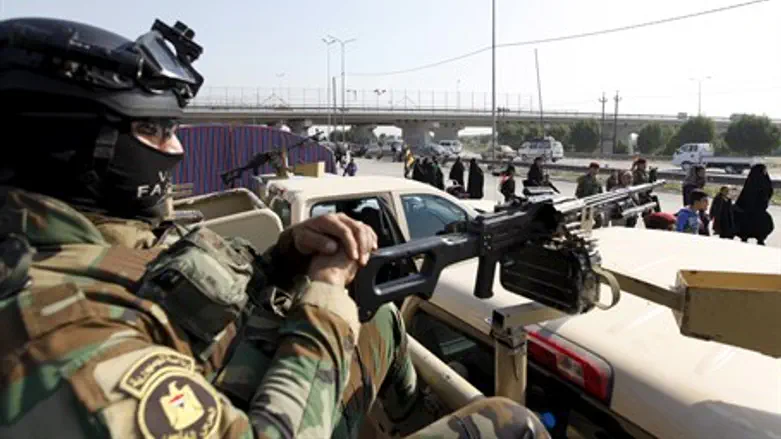
Iraqi forces battled the Islamic State group (ISIS) Monday in the opening stages of an operation to retake Fallujah, one of the toughest targets yet in Baghdad's war against the jihadists.
As Iraqi forces struck targets in and around the jihadist bastion, which saw deadly battles in 2004 between insurgents and American forces, ISIS claimed bombings in neighboring Syria that killed more than 120 people.
The jihadist group has increasingly turned to its traditional tactic of killing civilians in bombings as it faces battlefield losses, and spokesman Abu Mohammed al-Adnani appeared to acknowledge in a recent statement that ISIS would probably lose more ground.
"In the early hours of the morning today, the heroic fighters advanced from different sides" to retake "all the areas occupied by (ISIS) around Fallujah", Iraqi Prime Minister Haider al-Abadi announced in televised remarks.
Abadi said the operation was supposed to start earlier, but "political problems and also the events... threatening security inside Baghdad delayed some of the preparations."
Iraq has been hit by a months-long political crisis that has paralyzed the legislature, and demonstrators have twice broken into the fortified Green Zone area, storming parliament and Abadi's office.
ISIS has also carried out a series of deadly attacks in and around Baghdad this month.
Abadi earlier said that special forces, soldiers, police, militia forces and pro-government tribesmen were taking part in the offensive to retake Fallujah in Anbar province just 50 kilometers (30 miles) west of Baghdad.
Iraqi forces had not yet entered the city, but an AFP photographer near Fallujah said they were advancing while aircraft carried out strikes on targets inside it.
Bombings kill over 120
Abadi's announcement settled the issue of which ISIS-held city Iraq should seek to retake next - a subject of debate among Iraqi officials and international forces helping Baghdad battle the jihadists.
Iraq's second city Mosul was the US military's recommended target, but powerful Iraqi militias may have helped force the issue by deploying reinforcements to the Fallujah area in preparation for an assault.
On Sunday, Iraq's Joint Operations Command warned civilians still in Fallujah - estimated to number in the tens of thousands - to leave.
It warned families that could not depart to raise a white flag over their location and stay away from IS headquarters and gatherings.
Officials said several dozen families had fled the city, but ISIS has sought to prevent civilians from leaving, and forces surrounding Fallujah have also been accused of preventing foodstuffs from entering.
Anti-government fighters seized Fallujah in January 2014 after security forces withdrew during unrest sparked by the government's destruction of a protest camp, and the city later became one of ISIS's main strongholds.
Fallujah and Mosul, the capital of the northern province of Nineveh, are the last two major cities ISIS holds in Iraq.
Iraqi forces have regained significant ground in Anbar province in recent months, but as the jihadists are pushed back they are stepping up their deadly bombings.
On Monday, seven bombings, most of them suicide attacks, hit the Syrian cities of Jableh and Tartus, killing at least 120 people, according to the Syrian Observatory for Human Rights monitoring group.
Insurgent bastion
Observatory head Rami Abdel Rahman said they were "without a doubt the deadliest attacks" on the two cities since Syria's conflict erupted in March 2011.
The jihadists have also struck Baghdad, and attacks in and around the Iraqi capital have killed more than 160 people this month.
Fallujah has a long history as an insurgent bastion, and American forces launched two major assaults on the city in 2004, in which they saw some of their heaviest fighting since the Vietnam War.
Iraqi forces have the advantage of greater knowledge of the area, especially if they employ pro-government Anbar tribal fighters in the battle, but they lack the training and enormous firepower that American forces could bring to bear.
ISIS overran large areas north and west of Baghdad in June 2014, and Iraqi forces performed dismally during the initial offensive despite significantly outnumbering the jihadists.
But the "caliphate" the jihadist group subsequently proclaimed has been shrinking as anti-ISIS forces score major victories in both Iraq and Syria, where the group had also seized significant territory.
Several key ISIS leaders, including its number two, have been killed in air strikes by the US-led coalition.
In an audio message released on Saturday, ISIS spokesman Adnani appeared to anticipate more losses, saying the group would not be defeated even it loses all the cities it holds.
But the battle for Fallujah - a city that ISIS has had some two years to reinforce - will be one of the toughest challenges Iraqi forces have yet faced.
AFP contributed this report.
